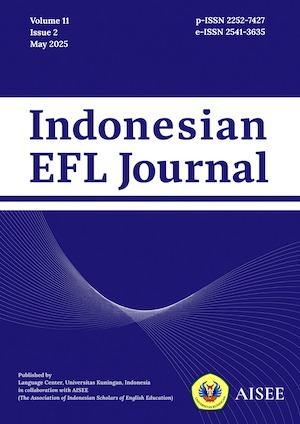SPEAKING PERFORMANCE AND PROBLEMS FACED BY ENGLISH MAJOR STUDENTS AT A UNIVERSITY IN SOUTH SUMATERA
Abstract
The objectives of this study were to discover the students’ speaking performance, speaking problems, and factors associated with the problems. The participants were the university students of an English education program in South Sumatera. To collect the data, speaking performance test, questionnaire, and open-ended questions were used. The findings showed that 42% of the participants did well and 58% did not perform well in the speaking test. The speaking problems were categorized as affected-related problems (self-confidence and anxiety), socially related problems (difficulties to find opportunities to learn English and comprehension in speaking class), and linguistically related problems (fluency, grammar, vocabulary, and pronunciation). The factors causing the speaking problems are lack of general knowledge, lack of speaking practice, fear of mistake, lack of words usage and grammar practice, low motivation, low participation, reading laziness, shyness, less dictionary usage, nervousness, fear of criticism, and unfamiliar words pronunciation. The data were calculated using Chi-Square Association with p-value (603.508) which is greater than the critical value (70.003). Therefore, there is a significant association between the speaking problems and the factors causing the problems.
Keywords: causes of problems; speaking performance; speaking problems
References
Afshar, H. S., & Asakereh, A. (2016). Speaking skills problems encountered by Iranian EFL freshmen and seniors from their own and their English instructors’ perspectives. Electronic journal of Foreign language teaching, 13(1), 112-130. Retrieved from http://e-flt.nus.edu.
Al-Roud, A. A. (2016). Problems of English Speaking Skill that University Students Encounter from Their Perspectives. British Journal of Education, Society & Behavioural Science. 18(3): 1-9. DOI: 10.9734/BJESBS/2016/28404. Retrieved from http://www.sciencedomain.org/review-history/16679
Alyan, A.A. 2013. Oral Communication Problems Encountering English Major Students: Perspectives of Learners and Teachers in Palestinian EFL University Context. Arab World English Journal. (4) 2, 226-238
Baker, J., & Westrup, H. (2003). Essential Speaking Skills: A Handbook for English Language Teachers. London, UK: Continuum.
Bashir, M., Azeem, M., & Dogar, A. H. (2011). Factor Effecting Students’ English Speaking Skills. British Journal of Arts and Social Sciences, 2(1), 34-50.
Bekai, W., & Harkouss, S. (2018). The role of motivation in teaching speaking in esp: a case study of a Lebanese Private University. The journal of teaching English for specific and academic purposes. 6(1), 141150. Https://doi.org/10.22190/JTESAP1801141B
Buku Pedoman Akademik dan Kemahasiswaan Tahun akademik 2018/2019. (2018). Retrieved from
http://www.unsri.ac.id/download/Pedoman%20Akademik%20dan%20Kemahasiswaan%202018-2019.pdf
California State Department of Education (1981). SOLOM: Student Oral Language Observation glossary for the teacher: Cooperative Learning. Greta Journal, 14, 1/2, 80-84. Retrieved from http://www.cal.org/twi/EvalToolkit/appendix/solom.pdf
Hadijah, S. (2014). Investigating the problems of English speaking of the students of Islamic boarding school program at Stain Samarinda. Dinamika ilmu, 4(2), 240-247.
Harganauer, G., Hascher, T., & Volet, S. E. (2015). Teacher emotions in the classroom: associations with students’ engagement, classroom discipline and the interpersonal teacher-student relationship. European Journal of Psychology of Education. doi: 10.1007/s10212-015-0250-0 retrieved from https://www.researchgate.net/publication/276859758_Teacher_emotions_in_the_classroom_Associations_with_students'_engagement_classroom_discipline_and_the_interpersonal_teacher-student_relationship
Hosni, A. S. (2014). Speaking difficulties encountered by young EFL students. International Journal on Studies in English Language and Literature (IJSELL), 2(6), 22-30.
Ihsan, M.D. 2016. Students Motivation in Speaking English. Journal of English Educators Society (JEES). (1) 1. 31-48
Lawtie. (2004). Biodiesel and Speech Difficulties. available at: [email protected]:/www.scips.worc.ac.uk/subjects_and_challenges/biosciences/b iosci_speech.
Liu, M. & Jackson, J. (2014). Reticence and anxiety in oral English lessons: A case study in China. In L. Jin, & M. Cortazzi (Eds.), Research Chinese Learner: Skills, Perceptions, and Intercultural Adaptations (pp. 119-137). London, England: Palgrave Mcmillan.
Mahripah, S. (2014). Exploring Factors Affecting EFL Learners’ Speaking Performance: from Theories into Practices. Proceedings of the 3rd UAD TEFL International Conference 2014 “Materials Development in Asia and Beyond: Directions, Issues, and Challenges.” English Education Department, Universitas Ahmad Dahlan, Yogyakarta, Indonesia.
Mufidah, H. (2017). Factors affecting the speaking difficulties of the eleventh grade hotel accommodation students at SMK Negeri 6 Palembang. (Undergraduate thesis). Islamic State University Raden Fatah Palembang, Palembang, Indonesia. Retrieved from http://eprints.radenfatah.ac.id/1395/1/HANUM%20MUFIDAH%2013250031.pdf
Nation, I. S. P., & Newton, J. (2009). Teaching ESL/EFL Listening and Speaking. ESL & Applied Linguistics Professional Series. Milton Park, UK: Routledge Taylor & Francis Group.
Rao, P.S. (2019). The Importance od Speaking English in English Classrooms. Alford Council of International English & Literature Journal(ACIELJ), 2(2), 6-18
Rao, P.S. (2018). Developing speaking skills in ESL or EFL settings. International Journal of English Language, Literature And Translation Studies, 5(2), 286-293.
Richards, J.C., & Renandya, W.A. (2002). Methodology in language teaching. Cambridge, UK: Cambridge University Press.
Shen, M., & Chiu, T. (2019). EFL learners’ English speaking difficulties and strategy use. Education and Linguistics Research, 5(2), 88-102.
Shvidko, E. V. (2012). Students' Perspectives on Language Use Outside the Classroom in an Intensive English Program. All Theses and Dissertations. 3115. Retrieved from: https://scholarsarchive.byu.edu/etd/3115, Brigham Young University
Scrivener, J. (2005). Learning teaching. Oxford, UK: Macmillan Publishers Limited.
Scrivener, J. (2011). Learning teaching: The essential guide to English language teaching (3rd ed.). Oxford, UK: MacMillan.
Tanveer, M. (2007). Investigation of the Factors That Cause Language Anxiety for ESL/EFL Learners in Learning Speaking Skills and the Influence It Casts on Communication in the Target Language. Dissertation, University of Glasgow.
Trialoka, V.S. Puspita, H and Sabbarudin, S. 2017. English Learners. Strategies in Learning Speaking Spekaing Skill (A Study of Undergraduate Students of English Education Study Program at Universitas Bengkulu in 2016/2017 Accademic Year. Journal of English Education and Teaching (JEET) (1) 1. 9-20
Verghese, P. C. (2009). Teaching English as a second language (9th ed.). New Delhi, India: New Delhi Sterlling Publishers.









